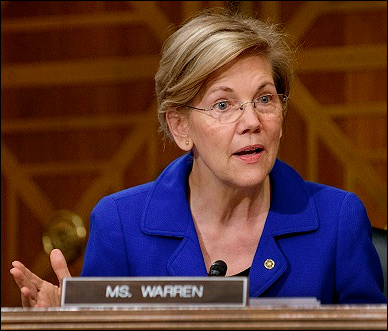By Jim Ellis
Sept. 24, 2019 — Des Moines-based Selzer & Company, largely regarded as the most accurate pollster of the Iowa electorate, just released their latest data for the Des Moines Register newspaper (Sept. 14-18; 602 likely Iowa Democratic Caucus attenders) and it contains significant positive news for Massachusetts Sen. Elizabeth Warren.

Democratic presidential candidate, Sen. Elizabeth Warren
The Selzer pollsters also asked the individuals’ second choice if for some reason their original chosen candidate was no longer in the race. Combining the results provides us a further gauge into Warren’s underlying strength as defined in this particular poll.
Selzer projects Warren scoring 42 percent support on the combined first and second choice ballot test response. This is 12 points better than Biden’s 30 percent, and doubles Sen. Sanders’ combined figure of 21 percent. Mayor Buttigieg and Sen. Harris follow with 18 and 12 percent, respectively.
The large percentage going to Warren and, perhaps more significantly, the margin between she and Biden, and Warren and Sanders, suggests a greater underlying electoral strength than any of the other candidates within this Iowa respondent group. In a limited participation caucus meeting nominating event, depth of support is highly likely to be the winning difference.
It is clear that Biden is attempting to establish himself as the national front runner for the party nomination and Iowa is very important toward such an end. As the leading national candidate, losing the first event could send a campaign into a downward spiral because the first set of high campaign expectations was not met.
Iowa is particularly important for Biden because faring poorly would then place him in a very difficult position heading to the second nominating event, the New Hampshire primary, in both Warren and Sanders’ New England political backyard. Should he lose New Hampshire, questions would become rampant whether he could right his political ship. While Biden’s numbers throughout the south appear strong, the question as to whether he can get there will become salient.
Most of the segmentation numbers also favor Warren. In the under age 35 group, 27 percent prefer her to Sanders (22 percent), while Biden can only tie Buttigieg with nine percent support. She also leads among those who fall between 35 and 54 years of age, over Biden 23-20 percent while Sanders, Buttigieg, and Harris score 12, 11, and six percent. Among women, Warren posts 27 percent to Biden’s 18 percent. Buttigieg, Sanders, and Harris record nine, nine, and seven percent, respectively.
Cutting into the traditional Sanders base, Sen. Warren also develops a big lead among those who describe themselves as “very liberal.” She more than doubles Sanders’ support within this category, 48-20 percent, while Biden, Buttigieg, and Harris all attract seven percent preference. With those who describe themselves as “liberal”, Warren has 24 percent as compared to Biden, Buttigieg, Sanders, and Harris getting 14-14-12, and seven percent. She also tops the field with those who live in a city and the group who says they are suburban residents.
Biden rises to the top in several segments as well, but is clearly not as strong with the underlying groups as Sen. Warren. The former VP does well with those over age 55 (29-17 percent over Warren), with men (24-16-15 percent over Warren and Sanders), self-described “moderates” (31 percent to Warren’s 10 percent, and all others in single digits), and those who live in towns (22-20 percent over Warren) and rural areas (topping Warren 29-18 percent).
The Selzer poll could be the beginning of what might become a solidifying trend for Sen. Warren within the Iowa Democratic constituency. Should it prove so, Sen. Warren would be on the precipice of a victory that could well lead to eventual nomination and the opportunity of achieving her goal to face President Trump in the general election.
